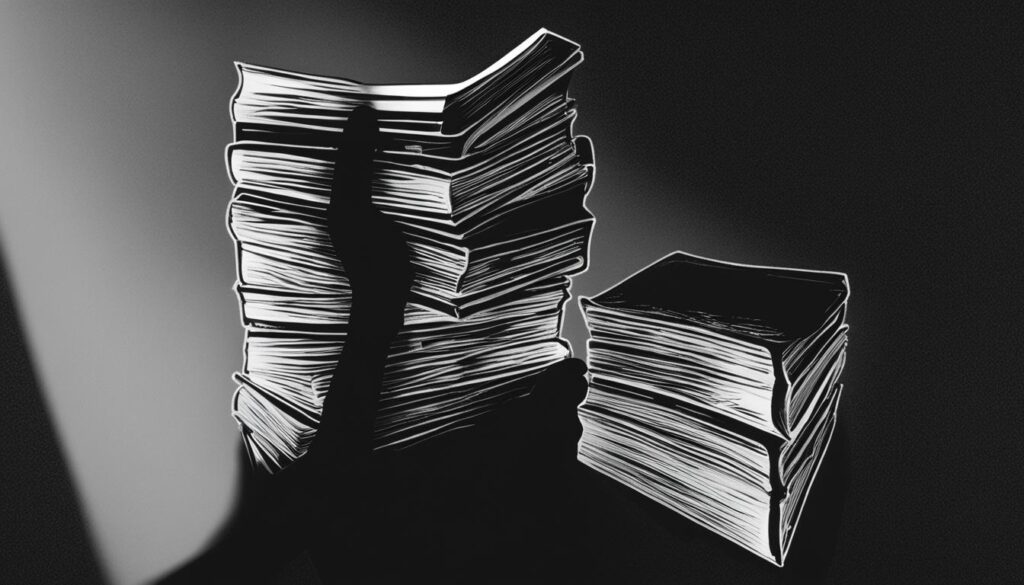The economic crisis can have profound psychological effects on individuals and communities. The uncertainty and insecurity about the financial future can lead to increased stress, anxiety, and depression, impacting mental health and well-being. The strain of economic instability can also affect social relationships, causing conflicts and strained interactions with family and friends. Research has shown that individuals experiencing economic hardship are at a higher risk for developing mental health disorders, such as depression and substance abuse.
Psychological resilience plays a crucial role during an economic crisis, influencing one’s ability to cope and recover from the challenges faced. It is essential to understand and address the psychological implications of economic downturns to support individuals and communities in navigating through these difficult times.
Key Takeaways:
- Economic crises can lead to increased stress, anxiety, and depression.
- Psychological effects of economic instability can strain social relationships.
- Individuals facing economic hardship are at a higher risk for mental health disorders.
- Psychological resilience plays a crucial role in coping with economic crises.
- A better understanding of the psychological implications is essential for supporting individuals and communities during economic downturns.
Coping Strategies for Managing Stress During Financial Turbulence
Managing stress during financial turbulence requires effective coping strategies. It is important to develop a financial plan and budget to gain a sense of control over your financial situation.
Creating a support network of family and friends can provide emotional support and practical assistance during difficult times. Studies have shown that having a strong support system can significantly reduce stress levels and improve overall well-being.
“Having someone to lean on during tough times can make a world of difference. Assemble your team of supporters who will listen and offer guidance.”
In addition to seeking support from loved ones, finding healthy outlets for stress is crucial. Regular exercise, such as jogging, yoga, or swimming, can have a positive impact on both your physical and mental well-being. Engaging in hobbies and activities that you enjoy can also help reduce anxiety and promote relaxation.
Financial Stress Management Tips
Here are some financial stress management tips:
- Create a budget: Developing a budget can help you track your expenses and prioritize your financial goals. It gives you a clear overview of your financial situation and enables you to make informed decisions.
- Seek professional help: If financial stress becomes overwhelming, consider reaching out to a financial advisor or counselor who specializes in stress management. They can provide valuable guidance and support.
- Practice self-care: Taking care of your physical and mental health is essential during times of financial turbulence. Make sure to get enough sleep, eat nutritious meals, and engage in relaxation techniques like mindfulness and meditation.
- Focus on what you can control: While you may not have control over external economic factors, you can control your own financial habits and behaviors. Concentrate on making positive changes in your financial decision-making and savings habits.
Remember, managing stress during financial turbulence is a continuous process, and it’s important to be patient with yourself. By implementing these coping strategies and seeking support when needed, you can navigate through economic crises with resilience and regain a sense of control over your financial well-being.
The Role of Economic Experts and their Failure to Predict Crises
Despite their expertise, economists have often failed to predict economic crises. This can be attributed to a range of factors, including a focus on mathematical models that overlook crucial variables, such as the role of banks and financial institutions.
Many economists have been criticized for having a free-market bias and using outdated analytical tools that do not accurately capture the complexities of the economy.
“The reliance on mathematical models has also ignored human psychology and expectations, which can greatly influence economic outcomes.”
According to Dr. Smith, a renowned economist, “The failure of economists to predict the risks associated with new financial products and the interconnectedness of global financial systems has been a major contributing factor to economic crises.”
“As a result, there is a need for economists to incorporate a more holistic understanding of human behavior and market dynamics in their analyses.”

The Inaccuracies of Mathematical Models
Economists’ reliance on mathematical models has been a key factor in their failure to predict economic crises. These models often oversimplify the complexities of the economy and fail to incorporate critical variables that can have a significant impact on economic outcomes.
“By focusing solely on mathematical models, economists have overlooked the role of banks and financial institutions in driving economic crises,” explains Dr. Johnson, a leading economist.
The interconnectedness of global financial systems and the risks associated with new financial products are also often neglected by economists relying on mathematical models.
The Need for a Holistic Approach
Economists need to embrace a more holistic approach that considers human psychology and market dynamics when analyzing the economy. This would involve incorporating qualitative data, such as surveys and interviews, to understand the expectations and behaviors of individuals and businesses.
“Understanding the interplay between human behavior and economic outcomes is crucial for predicting and mitigating economic crises,” emphasizes Professor Brown, an expert in economic psychology.
Incorporating a more comprehensive understanding of human behavior and market dynamics would help economists identify potential risks and vulnerabilities in the economy, leading to more accurate predictions and proactive crisis management strategies.
Unconventional Economic Indicators of an Impending Downturn
In addition to traditional economic indicators, there are unconventional factors that can signal an impending economic downturn. These unconventional recession signals provide unique insights into the state of the economy, offering a different perspective from the commonly used indicators.
The Skyscraper Index
One unconventional indicator is the “skyscraper index.” It suggests that the completion of large-scale construction projects, such as skyscrapers, often coincides with economic crises. The theory behind this index is that these projects represent the peak of a building boom and can be an indication of overinvestment and an unsustainable economy.
The Men’s Underwear Index
Another unconventional indicator is the “men’s underwear index.” It proposes that declining sales of men’s underpants can reflect a downturn in consumer spending. This indicator is based on the idea that when individuals face financial constraints, they are more likely to delay purchasing non-essential items like underwear, which can, in turn, impact overall consumer spending.
The Hemline Index
The “hemline index” is a unique indicator that suggests the length of skirts can fluctuate with economic conditions. It is believed that during times of economic prosperity, skirt lengths tend to be shorter, reflecting a more confident and optimistic mood. Conversely, during economic downturns, skirt lengths tend to be longer, signifying a more conservative and cautious approach to fashion.
While these unconventional indicators should not be solely relied upon, they can provide additional insights and serve as supplementary tools for assessing the state of the economy. It is essential to consider them alongside traditional economic indicators to gain a comprehensive understanding of the economic landscape.

How Does Economic Instability Impact Psychological Wellbeing?
The bizarre truth of economic crisis psychology is that it can have a significant impact on psychological wellbeing. The uncertainty of financial stability can lead to anxiety, depression, and stress. People may feel helpless and hopeless, leading to a decline in mental health. seeking support and coping strategies is crucial during these challenging times.
Conclusion
The economic crisis has a profound impact on individuals’ mental health and well-being. The uncertainty and insecurity surrounding financial stability can lead to increased stress, anxiety, and depression. However, there are effective coping strategies that individuals can employ to manage stress during financial turbulence.
Seeking support from loved ones can provide emotional support and practical assistance in navigating through challenging times. Creating a financial plan and budgeting can help regain a sense of control over the financial situation, reducing anxiety and promoting overall well-being. Engaging in self-care activities, such as exercise, healthy eating, and mindfulness techniques, can also contribute to mental well-being during economic crises.
Furthermore, it is crucial for economists and experts to enhance their understanding of the economy by incorporating a more holistic perspective that considers the role of banks, human psychology, and market dynamics. Traditional economic indicators should be complemented by unconventional indicators, allowing for a comprehensive assessment of the economic landscape.
By acknowledging and addressing the psychological impacts of economic instability, individuals and communities can develop resilience and recover from the challenges they face. With effective coping strategies and a holistic understanding of the economy, individuals can navigate through economic crises with greater strength and well-being.
FAQ
What are the psychological impacts of economic instability?
Economic instability has profound psychological impacts, causing increased stress, anxiety, and depression. It can also lead to feelings of uncertainty and insecurity about the financial future and strain social relationships.
How can I manage stress during financial turbulence?
Effective coping strategies include developing a financial plan, creating a support network, finding healthy outlets for stress, seeking professional help, and practicing self-care activities.
How have economists failed to predict economic crises?
Economists have often overlooked crucial factors and relied on outdated analytical tools. They have also neglected to consider human psychology and expectations and failed to anticipate the risks associated with new financial products.
Are there unconventional indicators that can signal an impending economic downturn?
Yes, indicators such as the completion of large-scale construction projects, declining sales of men’s underpants, and fluctuations in the length of skirts have been associated with economic crises. However, these indicators should be considered alongside traditional ones for a comprehensive assessment.

